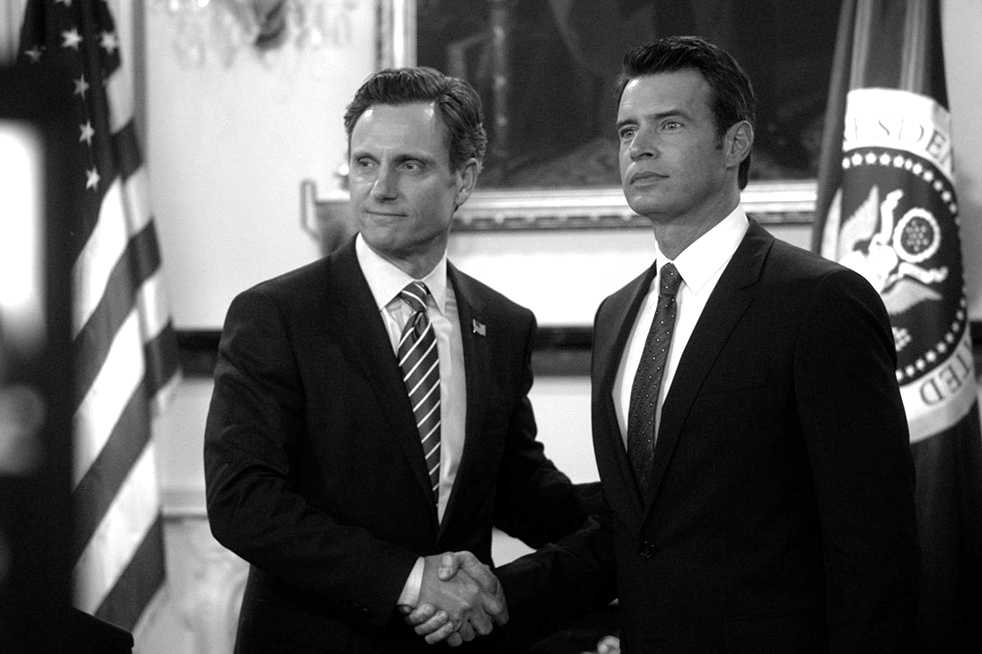Shonda Rhimes’s political drama “Scandal” on ABC returned from its mid-season hiatus on Feb. 11 and hit the ground sprinting.
Following their breakup in the mid-season finale, Olivia Pope (Kerry Washington, “Django”) and President Fitzgerald “Fitz” Grant (Tony Goldwyn, “Divergent”) have had no communication while Olivia resumes a heated affair with intelligence officer Jake Ballard (Scott Foley, “Scream 3”). Fitz relies heavily on his press-secretary-turned-work-wife, Abby Whelan (Darby Stanchfield, “Waitress”), who in turn struggles with balancing international affairs, the media and Fitz’s own dependence and need to not be alone.
The plot begins with Olivia having dinner with her father, Rowan Pope (Joe Morton, “American Gangster”), who chastises Olivia for giving up power, prestige and access to the Oval Office. Olivia expresses her disappointment that Jake is currently living with Rowan, especially as the two do not like each other, and Rowan retorts that Jake has come home and that it is time she does as well.
When Olivia returns to her own home, she finds Jake awaiting her, and after a tense standoff they succumb to the standard melodrama trope of angrily sleeping together, playing into the soap opera stereotype.
The episode returns to the dealings of Olivia Pope & Associates, a crisis-management firm that the most powerful people in Washington turn to when their reputation is threatened. The client of the week is Diane Peters (McNally Sagal, “Pleasantville”), head of the NSA and first female in her job position. Confidential NSA files have been stolen from her home computer, including espionage conducted on the U.S.’s closest allies. Suspicion falls immediately on her programmer boyfriend, but after Olivia and her associates find his body, they realize he had been framed.
With such a severe threat to national security being the fault of the NSA’s own director, Diane Peters is forced to resign, and President Fitz must appoint a new director. Olivia discovers that the data thief and murderer of Diane’s boyfriend was none other than Jake Ballard, who, with the help of Rowan Pope, orchestrated the entire operation because Diane was too weak of a director. Jake is appointed the new head of the NSA, and Rowan warns Olivia that revealing the truth would devastate the balance of power in Washington.
Though “Scandal” does occasionally veer into melodrama, its hook is its fast pace and ability to let dialogue carry the plot. While movies tend to be plot-driven, serialized dramas tend to be driven by the actions of their characters. Olivia Pope is one of the most complex, fascinating characters on television, with her determined attitude, flawless wardrobe and ability to fix the problems in other peoples’ lives clashing with her own inability and, sometimes, reluctance, to fix the problems in her own. She is resolute but vulnerable, confident and capable but still prone to lapses in judgment due to strong emotion and stress.
However, the most intriguing aspect of “Scandal” is not just its wrenching plot and fast-paced dialogue but how it inflicts theme and tension. If the current show lineups are any indication, audiences never tire of power struggles, especially when an entire country is at stake. Scandal weaves power into the subtext of every scene, from the interactions between characters (Rowan constantly tests Olivia’s need to “stand on the mountaintop” to the soundtrack — the background music to Olivia and Jake’s sweaty rendezvous is Otis Redding’s “Tramp,” in which Redding sings of his grandeur to an unimpressed woman.
Starting, ending and interspersed throughout the episode is a monologue from “The Liberty Hour,” a political commentary show hosted by former Vice President Sally Langston (Kate Burton, “127 Hours”), where she addresses the audience directly and discusses the scramble for power in Washington. Serving as an unattached narrator, Sally brings the theme to a head by breaking the fourth wall and lamenting but not condemning the American obsession with power.
With people crossing every line for power both in the spotlight and behind the scenes, Sally proclaims she is proud to be an American, implying that the power struggles that serve as the backbone of “Scandal” are no different that the power struggles in Washington and that the fascination with such makes political thrillers like “Scandal” and “House of Cards” not so much fiction as they are an addictive observation.
4/5
